This episode was recorded Friday, December 1, 2023
Co-hosts: Serpil Oppermann and Gisela Heffes
FEATURED GUESTS/WORKS:
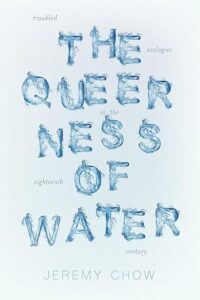 Jeremy Chow, The Queerness of Water
Jeremy Chow, The Queerness of Water
This book reconsiders canonical long eighteenth-century narratives through the conjoined lenses of queer studies and the environmental humanities. Moving from Daniel Defoe’s Robinson Crusoe and Jonathan Swift’s Gulliver’s Travels to Gothic novels including Mary Shelley’s Frankenstein, Jeremy Chow investigates the role that bodies of water play in reading these central texts.
Chow navigates various representations and phases of water to magnify the element’s furtive yet pronounced effects on narrative, theory, and identity. Water, Chow reveals, is both a participant and a stage upon which bodily violation manifests. The sea, rivers, pools, streams, and glaciers all participate in a violent decolonialism that fractures, revises, and reshapes notions of colonial masculinity emerging throughout the long eighteenth century.
 Jeremy Chow is an assistant professor of English at Bucknell University, which occupies the ancestral territories of the Susquehannock peoples. Chow’s research promiscuously explores the intersections among the environmental humanities; queer and trans studies; and theories of race and decolonization. Chow is the editor of Eighteenth-Century Environmental Humanities (2023) and the author of The Queerness of Water (2023).
Jeremy Chow is an assistant professor of English at Bucknell University, which occupies the ancestral territories of the Susquehannock peoples. Chow’s research promiscuously explores the intersections among the environmental humanities; queer and trans studies; and theories of race and decolonization. Chow is the editor of Eighteenth-Century Environmental Humanities (2023) and the author of The Queerness of Water (2023).
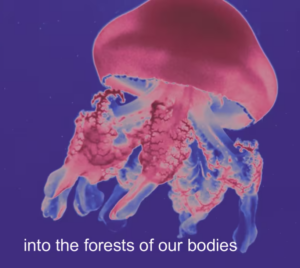 Tania Haberland, The Torrid Zone
Tania Haberland, The Torrid Zone
The Torrid Zone is an ecopoetic videopoem made in collaboration with Poetics of Reverie (Carine Iriarte). This is a collaborative artistic project mixing poetry, electro music, painting, short films, movement and nature.
 Tania Haberland, a tri-national poet (German-South African-Mauritian), is the hybrid of a Hamburg sailor and a Mauritian artist, born in Africa, raised in Arabia and matured in Europe. She publishes, performs and exhibits her poetry and multi-media collaborations across the globe. She lives in Italia and Mauritius where she writes, teaches, sings and creates with the water as her element of connection to this world. Her first collection Hyphen (UCT Writers Series 2009) won the 2010 Ingrid Jonker Prize. Her second collection, Water Flame / Fiamma d’acqua was published by Mille Gru editions in 2019. She co-edits the online bilingual ecopoetic Poetura column for Poetry Therapy Italia. The Torrid Zone was selected for the 2023 Berlin Zebra Poetry Film Festival and shortlisted for the 2023 ò Bhéal Poetry Film Contest.
Tania Haberland, a tri-national poet (German-South African-Mauritian), is the hybrid of a Hamburg sailor and a Mauritian artist, born in Africa, raised in Arabia and matured in Europe. She publishes, performs and exhibits her poetry and multi-media collaborations across the globe. She lives in Italia and Mauritius where she writes, teaches, sings and creates with the water as her element of connection to this world. Her first collection Hyphen (UCT Writers Series 2009) won the 2010 Ingrid Jonker Prize. Her second collection, Water Flame / Fiamma d’acqua was published by Mille Gru editions in 2019. She co-edits the online bilingual ecopoetic Poetura column for Poetry Therapy Italia. The Torrid Zone was selected for the 2023 Berlin Zebra Poetry Film Festival and shortlisted for the 2023 ò Bhéal Poetry Film Contest.
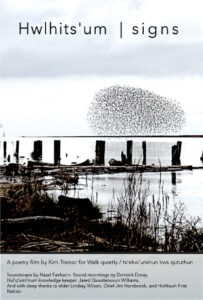 Kim Trainor, Hwlhits’um | signs
Kim Trainor, Hwlhits’um | signs
The poetry film Hwlhits’um | signs, created with the collaboration of the Hwlitsum First Nation and musician/composer Hazel Fairbairn, documents the impact of colonization on the Fraser estuary located in BC, Canada. Working from the line Mukw’stem ‘l’ utunu tumuhw ‘o’ slhiilhukw’tul-“Everything is interconnected,” the soundscape for “Hwlhits’um | signs” weaves together filter-swept field recordings made at Brunswick Point, MIDI data captured from the bioelectric activity of plants – used to trigger samples of birds and voices- with melodic fragments and electronica generated from spectrographs of maps and images from the film.
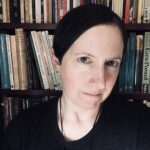 Kim Trainor is a poet and filmmaker. Her latest book of poetry, A blueprint for survival (Guernica Editions), will appear in Spring 2024.
Kim Trainor is a poet and filmmaker. Her latest book of poetry, A blueprint for survival (Guernica Editions), will appear in Spring 2024.
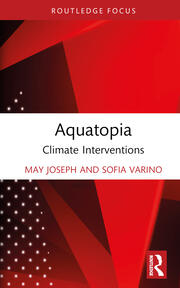 Sofia Varino and May Joseph, Aquatopia: Climate Interventions
Sofia Varino and May Joseph, Aquatopia: Climate Interventions
Aquatopia documents Harmattan Theater’s ecological interventions and traces its engagements with water-bound landscapes, colonial histories, climate change, and public space. The volume uses Harmattan’s site-specific performances as a point of departure to consider climate change and rising sea levels as geographical, ecological, and urban phenomena. Accompanied by close descriptions of five performances and supplemented by digital documentation available online, this volume intervenes in discussions on climate change, urbanism, and postcolonization/decolonialization, and contributes to interdisciplinary studies of ecology and environmental politics.
 Sofia Varino is a research fellow at the University of Potsdam in Germany, co-author of Aquatopia: Climate Interventions, co-editor of a special issue of Somatechnics on Data Matters, and has published in SHIMA, Whatever, European Journal of Women’s Studies and Women’s Studies Quarterly, among others.
Sofia Varino is a research fellow at the University of Potsdam in Germany, co-author of Aquatopia: Climate Interventions, co-editor of a special issue of Somatechnics on Data Matters, and has published in SHIMA, Whatever, European Journal of Women’s Studies and Women’s Studies Quarterly, among others.
Their co-author May Joseph, who is unable to join us for the episode, is the founder of Harmattan Theater, an environmental theater company based in New York City, and Professor of Global Studies in the Department of Social Science and Cultural Studies at Pratt Institute, New York. She is currently the Managing Co-Editor-in-Chief of Island Studies Journal.
